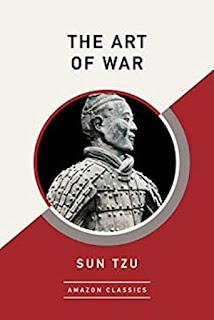The Tao of the Gentle Soldier
Sun Tzu’s “The Art of War,” may seem to be an incongruous Taoist classic. The greatest of the Taoist classics is “Tao Te Ching,” by Lao Tsu. In this Lao Tsu writes, ‘Whenever you advise a ruler in the way of Tao, council him not to use force to conquer the universe…
“Weapons are instruments of fear; they are not a wise man’s tools. He uses them only when he has no choice. Peace and quiet are dear to his heart. And victory is no cause for rejoicing. If you rejoice in victory, then you delight in killing.”
http://www.amazon.com/Tao-Te-Ching-Lao-Tsu/dp/039471833X
Nevertheless, Sun Tzu does not exalt in war. He regards it as occasionally a regrettable necessity. One should only fight when one has to, and when victory can be reasonably assured. He does not explain how one should respond to a powerful aggressor. He would probably recommend a negotiated surrender. The Mongolians devastated those who resisted them. They were merciful to those who surrendered without fighting.
Sun Tzu writes that it is best to win by not fighting, that is to say to induce the enemy to surrender before the war begins. What is the worst of situations is to devastate the enemy country. A conqueror wants to govern a populous empire, not a landscape of skeletons and ruined cities. Let a retreating enemy retreat. Do not attack it. If a retreating enemy believes that it has no choice but to fight to the death, it will kill more of your troops, even if victory is assured for you.
Treat prisoners of war humanely. That way, enemy soldiers will surrender when by continuing to fight they can harm you. Here Thomas Cleary’s version could be better translated. When he writes, “Treat the soldiers well, take care of them,” it is not clear whose soldiers is he is writing about. Other translations make it clear that he is writing about enemy soldiers who have been captured.
Sun Tzu also advises rulers to treat their own subjects humanely, so that they will be loyal subjects, and obedient soldiers.
One should practice deception. Attack important targets when they are lightly defended, and when the enemy does not anticipate an attack.
An example of this is Gen. MacArthur’s Inchon Landing during the Korean War. With light casualties he turned the tide of the Korean War, and forced a retreat of the North Korean Army. Then he violated Sun Tzu’s advice, following the retreating North Koreans to the border with Communist China, and demanding unconditional surrender. At this point Communist China entered the Korean War. That war lasted another two years. A more restrained response to North Korean aggression could have achieved a better result faster with fewer casualties to both sides.
After the War in the Gulf, Gen. Schwarzkopf complained that President George H.W. Bush ordered him not to continue to attack the Iraqi Army when it retreated from Kuwait. The Iraqi Army was being bombed from the air. Because it had no anti aircraft guns or missiles it could be bombed without loss of American lives. If the Iraqi Army had been annihilated, it could not have crushed the Shiite revolt that came soon after the Gulf War. A high percentage of ISIS fighters are Sunni veterans of the Iraqi Army.
What this means is that The Art of War should be read for insight, rather than doctrine. One should know when Sun Tzu’s advice is relevant, and when it is not.
https://www.amazon.com/gp/customer-reviews/RNCHXBY789C1Y?ref=pf_vv_at_pdctrvw_srp


Comments
Post a Comment